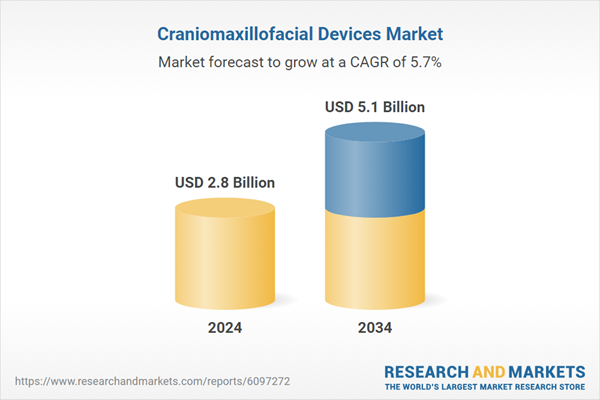Market growth is attributed to the rising occurrence of facial injuries resulting from road accidents, sports-related incidents, and violence, which are fueling the demand for reconstructive surgeries. Additionally, congenital facial deformities in children contribute to the increased need for CMF devices in pediatric surgeries. The trend toward minimally invasive surgical procedures, which offer faster recovery and shorter hospital stays, is also contributing to the growth. Advancements in surgical materials, such as biocompatible metals, and the continuous improvement in imaging technologies are playing a significant role in enhancing surgical outcomes. These innovations enable surgeons to perform more accurate and minimally invasive procedures, leading to quicker recovery times and reduced risk of complications. The ongoing development of advanced imaging systems allows for real-time visualization during surgeries, improving precision and overall safety for patients. As these technologies continue to evolve, they are expected to significantly contribute to the growth of the craniomaxillofacial devices market. Additionally, the rising healthcare spending in developing countries is facilitating greater access to CMF devices. Improved reimbursement policies in these regions are helping to make these devices more accessible, especially for complex facial reconstruction cases.
The MF plate and screw fixation system segment held 52.4% share in 2024 driven by the reliability in treating fractures of the mandible, midface, and skull, these systems remain among the most widely used in craniomaxillofacial surgeries. They offer precise alignment of bone fragments, contributing to faster recovery and enhanced healing. MF plate and screw fixation systems are favored by surgeons due to their straightforward application and efficient stabilization capabilities.
In terms of product segmentation, the internal fixators segment will grow at a CAGR of 5.4% through 2034, gaining popularity because internal fixators offer the benefit of providing internal stabilization, which reduces the risk of external infections. Their ability to promote bone healing during recovery makes them highly favored for minimally invasive surgeries. This preference for less invasive procedures aligns with patient and surgeon demand for less traumatic surgeries that also offer quicker recovery times.
U.S. Craniomaxillofacial Devices Market was valued at USD 1.3 billion in 2024 owing to the high incidence of traffic-related accidents and sports injuries, which often require reconstructive surgeries. With government programs improving healthcare access and technological innovations in medical devices, hospitals and clinics in the U.S. are increasingly adopting advanced CMF devices. This combination of high demand for facial reconstruction procedures and enhanced access to cutting-edge medical technologies is expected to continue driving the U.S. market growth in the coming years.
Key players in the Global Craniomaxillofacial Devices Market, such as Medtronic, Stryker, and Johnson & Johnson, focus on expanding their market presence through strategic acquisitions, product innovations, and technological advancements. Companies like B Braun and Integra are enhancing their portfolios by incorporating advanced imaging systems and biocompatible materials to improve surgical outcomes. Additionally, firms like Zimmer Biomet and KLS Martin are increasing their investments in research and development to stay competitive, ensuring they provide high-quality, efficient, and minimally invasive solutions. These strategies are helping these players strengthen their foothold in the rapidly evolving craniomaxillofacial devices market.
Comprehensive Market Analysis and Forecast
- Industry trends, key growth drivers, challenges, future opportunities, and regulatory landscape
- Competitive landscape with Porter’s Five Forces and PESTEL analysis
- Market size, segmentation, and regional forecasts
- In-depth company profiles, business strategies, financial insights, and SWOT analysis
This product will be delivered within 2-4 business days.
Table of Contents
Companies Mentioned
The companies profiled in this Craniomaxillofacial Devices market report include:- Acumed
- Anatomics
- B. BRAUN
- Beijing Naton Medical Technology
- BIOPLATE
- Cavendish Implants
- CranioTech
- JEIL MEDICAL
- Johnson & Johnson
- Kelyniam Global
- KLS Martin Group
- Matrix Surgical USA
- Medartis AG
- MEDPRIN
- Medtronic
- Stryker
- Xilloc Medical
- Zimmer Biomet
Table Information
| Report Attribute | Details |
|---|---|
| No. of Pages | 177 |
| Published | October 2025 |
| Forecast Period | 2024 - 2034 |
| Estimated Market Value ( USD | $ 2.8 Billion |
| Forecasted Market Value ( USD | $ 5.1 Billion |
| Compound Annual Growth Rate | 5.7% |
| Regions Covered | Global |
| No. of Companies Mentioned | 19 |









